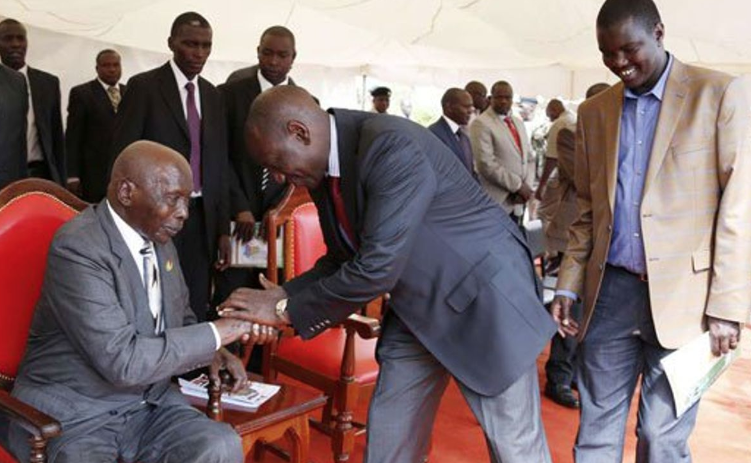

President William Ruto has shared an in-depth account of his political journey, tracing it back to the days when Kenya was under the rule of the Kenya African National Union (KANU) during the late President Daniel arap Moi’s tenure.
Ruto recounted how the Moi initially discouraged his political ambitions, particularly when he sought to be elected as MP for Eldoret North Constituency.
This revelation came during the launch of the autobiography of former Cabinet minister Major (Rtd) Marsden Madoka, titled At The Ready, held at State House, Nairobi.
Ruto highlighted the challenges he faced being an "unknown" figure in a political landscape dominated by established leaders and families.
Moi openly advised the people of Eldoret North not to support Ruto’s bid for parliament.
Ruto explained that this opposition was primarily because he came from a family without a notable political history, making him an underdog during the 1997 KANU nominations.
“I was really the underdog; people did not know me, and we didn’t have a history of any leadership in our family,” he said.
Despite the odds, he managed to secure the party’s nomination and eventually won the parliamentary seat.
Reflecting on that period, Ruto disclosed that he had not initially planned to run for the MP seat; circumstances led him there, but once he was in the race, he was determined to succeed.
At the time, KANU was the dominant political force, and Moi was a very formidable leader whose preferences held significant weight.
Ruto’s candidacy was met with resistance from senior party members who had connections and long-standing influence.
“Moi himself came to Eldoret and told people to elect those who were known, such as former MP Saina and wealthy people like Chesire,” Ruto recalled.
To build political support, Ruto allied himself with Paul
Boit, a former county council member known in Uasin Gishu for his wealth and
influence.
This association helped Ruto become more visible to the electorate during his first campaigns. His outspoken nature during this period stemmed from a deep sense of frustration with how KANU's leadership treated him, considering him an outsider.
Moi cautioned the electorate to be wary of newcomers like Ruto, whose background was unfamiliar to them. Despite these warnings, Ruto remained undeterred and secured victory in the party’s nominations against these more prominent persons
An incident at a subsequent Moi rally in Eldoret further underscored the challenges Ruto faced.
Moi expressed skepticism about Ruto’s qualifications, specifically questioning his family background.
During the rally, Moi acknowledged that one candidate was unopposed and a teacher, implying approval for that nominee, but cast doubt over Ruto by saying he didn’t know Ruto’s parents and hinted that voters should be cautious.
Ruto recalled how these remarks felt unfair and undermined his legitimacy because they implied that leadership ability was tied to family prominence.
After winning the parliamentary seat, Ruto’s vocal demeanor attracted attention at the highest levels of government. Though initially seen as a noisy upstart, his contributions and ideas eventually earned him respect.
Moi apparently sent church leaders Bishop Yego and Hosea Kiplagat to find out why Ruto continued to be outspoken.
“He told them that this young man, I understand he is a member of our church, but why is he making noise? Why don’t you look for him?” Ruto recalled.
These men advised Ruto to moderate his criticism and work more closely with Moi, advice that Ruto took seriously and which helped him gain the former president’s trust over time.
About a year and a half after Ruto’s election to parliament, Moi appointed him Assistant Minister in the Office of the President, a significant milestone marking his rising political career.
Ruto served in this capacity from 1998 until 2002. His political ascent continued when Moi elevated him to full Cabinet Minister, assigning him the Ministry of Home Affairs.
This promotion followed the dismissal of the late George Saitoti by Moi amidst tensions relating to the succession battle of 2002.
The launch event for At The Ready, Major Madoka’s autobiography, which detailed his own remarkable career in the military, civil service, and as a Cabinet minister, attracted a diverse group of attendees, including current and former government officials, military veterans, scholars, and family members.

















